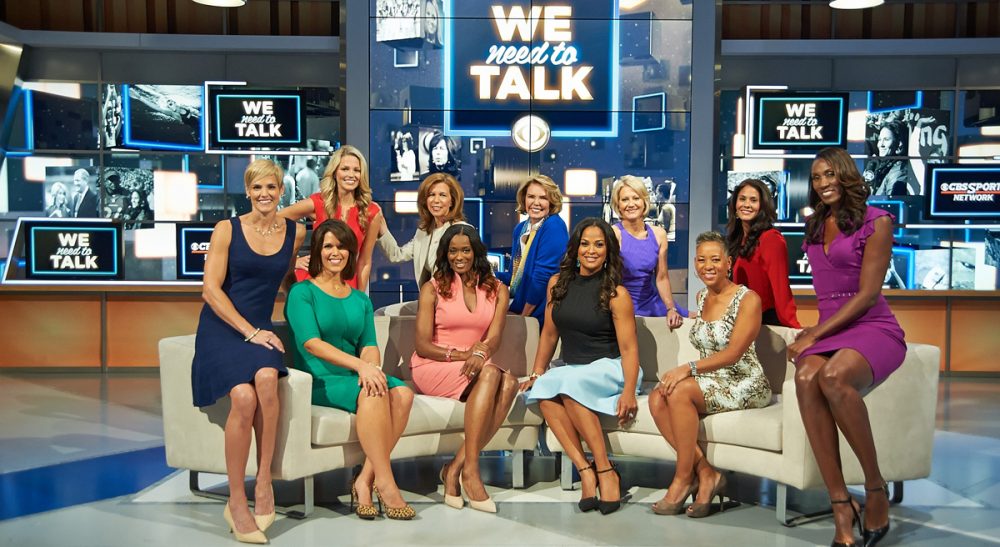Advertisement
So Long, Sidelines: Women Sports Journalists Find A League Of Their Own

CBS Sports recently launched We Need To Talk, the first-ever sports commentary show hosted, produced, researched and directed entirely by women. Yours truly is proudly included.
The show’s title pays cynical homage to that line that men so dread hearing from a woman: We need to talk. I prefer to put the emphasis elsewhere: We need to talk. As in, women, at long last, have a public forum in which to talk sports.
As a sports-loving girl, it would never have occurred to me that I might one day be able to write or commentate about sports, because there were no female role models to emulate.
As a sports-loving girl, it would never have occurred to me that I might one day be able to write or commentate about sports, because there were no female role models to emulate. Today, I meet a legion of girls and young women who say they want to “be me,” and I revel in the fact that the number of female members of the sports media is growing. Once relegated — literally — to the sidelines, as I was, or stuck in support roles, serving as warm-up acts for male analysts, female sports journalists today are recognized for their knowledge and opinions about the teams and the players they cover.
It’s about time.
I never believed that men were born with a gene to talk about sports, and that women just weren’t. This notion seems to persist, however. Men’s Health recently published a story headlined, “The Secret to Talking Sports With Any Woman.” The thesis: Women don’t care about stats; we like stories. The subtext: Women don’t worry their pretty little heads with the numbers. In fact, women, just like men, appreciate both the statistics that drive rankings and strategy, and the up-close-and-personal narratives that make players human and the stakes of their contests that much higher. The article Men’s Health should really publish? “How Not to Be Intimidated If A Woman Knows More About Sports Than You Do.”
It’s not just that women can love, appreciate and talk about sports just like the men can. It’s that we bring a different sensibility to it. Most pregame shows — especially for football — strike me as a gaggle of screaming men. The men may not know what they’re talking about, but they’re yelling, so they must know something, right?
In contrast, women — at least the smart, accomplished ones on our show — don’t bloviate. We don’t scream over each other. And we don’t exist as a program to dissect so-called “women’s issues” in sports, as the recent spate of domestic violence among pro-ball players has been euphemistically termed. In fact, men beating women and children is a male problem, and I hope to hear more men talking about how to solve it.
I long dreamed of an all-female sports program. When Tyler Hale, CBS’s vice president for studio production, first approached me about actually doing one, I wanted to know one thing in particular: Who is the target audience? Everyone who loves sports, came the answer, male and female. I was in.
In fact, women, just like men, appreciate both the statistics that drive rankings and strategy, and the up-close-and-personal narratives that make players human and the stakes of their contests that much higher.
Since the show began airing on September 30, the focus has been on the content of our pieces, not the gender of our hosts and production team. This gives me hope that this shift I’ve sensed in the sports journalism landscape away from male domination will continue.
Perhaps my favorite review yet came from a veteran male producer I’ve known for several decades.
“I'm going to make a sexist confession to you,” he told me. “Despite the fact that I was raised by a mother who was friends with Betty Friedan and Bella Abzug, and others on the front lines of the feminist barricades… at some point during the second and third segment of the show I found myself thinking, ‘these women really know sports — there's nothing superficial about this, there's a real depth of knowledge and thinking amongst these four. And a tremendous ability to articulate it."
It’s nice that he agrees with what women everywhere already knew. We do need to talk about sports. And anyone who might have doubted that needs to listen.
Related:
